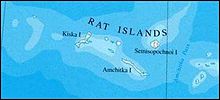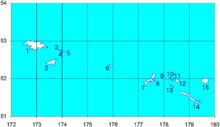Rat Islands
51°47′17″N 178°18′10″E / 51.78806°N 178.30278°E


The Rat Islands (Aleut: Qax̂um tanangis,[1]) are a group of American volcanic islands in the Aleutian Islands in southwestern Alaska, between Buldir Island and the Near Islands group to its west, and Amchitka Pass and the Andreanof Islands group to its east. The islands in the group are, from west to east, Kiska, Little Kiska, Segula, Hawadax or Kryssei, Khvostof, Davidof, Little Sitkin, Amchitka, and Semisopochnoi. The total land area of the Rat Islands is 360.849 sq mi (934.594 km2). None of the islands are inhabited at present,[2] but Amchitka Island was an Aleut territory until the end of the eighteenth century.[3]
The name Rat Islands is the English translation of the name given to the islands by Captain Fyodor Petrovich Litke in 1827 when he visited the Aleutian Islands on a voyage around the world. The islands are named so because rats were accidentally introduced to Hawadax Island (formerly known as Rat Island) in about 1780.[4] As of 2009[update], after a government-funded eradication program, Rat Island is believed to be rat-free;[5] it was renamed Hawadax Island in 2012. However, a post-operation assessment found that many of the island's local bird populations were negatively impacted—there was a far higher-than-expected nontarget mortality.[6] An internal U.S. Fish and Wildlife Service Office of Law Enforcement investigation revealed that several laws may have been violated.[7]
The Rat Islands are earthquake-prone as they are located on the boundary of the Pacific and North American tectonic plates.[citation needed] The 1965 Rat Islands earthquake was one of the largest in recorded history with a magnitude of 8.7.[8]
References
[edit]- ^ Bergsland, K. (1994). Aleut Dictionary. Fairbanks: Alaska Native Language Center.
- ^ Amy Tikkanen (12 December 2023). "Rat Islands". Encyclopedia Brittanica. Retrieved 7 February 2024.
- ^ "Fact Sheet: Amchitka, Alaska, Site, A Nevada Offsite" (PDF). U.S. Department of Energy. August 2021. Retrieved 7 February 2024.
- ^ "Living on Earth: Taking the "Rat" out of Rat Island". loe.org.
- ^ "Alaska's Rat Island rat-free after 229 years". Reuters. 12 June 2009.
- ^ "The Rat Island Rat Eradication Project: A Critical Evaluation of Nontarget Mortality" (PDF). The Ornithological Council. 2010.
- ^ "Report of Investigation: Rat Island Mortality". U.S. Fish and Wildlife Service. 2010.
- ^ "20 Largest Earthquakes in the World". United States Geological Survey.
Further reading
[edit]- Stolzenburg, William (2012). Rat Island: Predators in Paradise and the World's Greatest Wildlife Rescue. Bloomsbury Publishing. ISBN 9781408825174.
External links
[edit]![]() Media related to Rat Islands at Wikimedia Commons
Media related to Rat Islands at Wikimedia Commons
- Rat Islands: Blocks 1138 thru 1145, Census Tract 1, Aleutians West Census Area, Alaska United States Census Bureau
